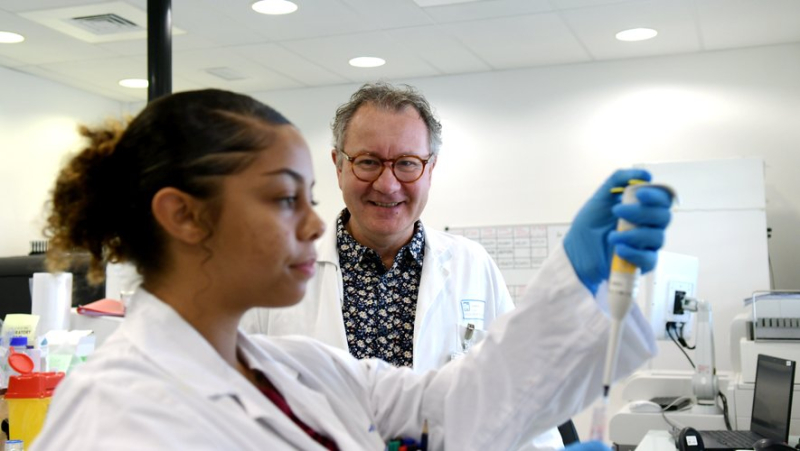“A big step forward” against Alzheimer's: a blood test to aid diagnosis developed at Montpellier University Hospital is being rolled out to specialists

Le test sanguin est développé autour du marqueur identifié dans l'équipe du professeur Lehmann. Midi Libre – MICHAEL ESDOURRUBAILH
More than 900,000 people are affected by Alzheimer's in France. A few days before the global day of mobilization on September 21, Professor Sylvain Lehmann and his team from the clinical proteomic biochemistry laboratory at Montpellier University Hospital are deploying a rapid blood test to specialized doctors that has proven itself in a research protocol on 300 patients. This is a major breakthrough, given that 225,000 new diagnoses are made each year.
After identifying one of the markers of Alzheimer's, PTAU-217, Sylvain Lehmann and his team worked with manufacturers to develop a rapid blood test for the disease. Tested as part of a research protocol on 300 patients in Montpellier, Nîmes and Perpignan, the test is now available to specialists in the disease. The first blood samples arrive at the Montpellier University Hospital.
What is the status of the blood test for Alzheimer's disease, which you and your team have been working on for years? It was planned to make it available to doctors in 2025?
This month, we are starting to do dosages for the teams at the Montpellier, Nîmes and Perpignan University Hospitals. It is progressing faster than expected: I had said “not before 2025”. We are starting to receive and analyze blood samples sent by clinical services.
A research phase, on a cohort of 300 patients, allowed us to validate the test, which is almost 90% reliable.
There are blood markers that can identify Alzheimer's ten years before the first symptoms appear.
Ethical issues have often prevented these early diagnoses…
We have long since moved beyond this debate… the test is not used to predict the onset of the disease, we do not do a dosage before signs appear.
The test is available to specialists, not yet to general practitioners, even though there is strong pressure for it to move forward. It is an aid to diagnosis, with other biological tests, imaging, as part of multidisciplinary care.
The goal of this test is to avoid performing a lumbar puncture, a painful and invasive test.
How does it work ?
We measure the protein PTAU-217, which is also found in the brains of patients. We have the results in a few hours. This week, we are doing about thirty tests, we don't want more. We are in the implementation phase, with doctors who know the disease and who know these tests, in Montpellier, Nîmes and Perpignan.
“We are not far from routine tests”
The test was developed at the Montpellier University Hospital ?
The marker, PTAU-217, one of the markers of Alzheimer's, was identified in my laboratory five years ago. We did not patent our research. Manufacturers developed the test around it, and we used it for a long time for research purposes, with technologies that were cumbersome, such as mass spectrometry. Today, we are not far from routine tests. Initially, we worked with start-ups. Today, we work with large companies, such as the Japanese Fujirebio. Others are arriving on the market, such as Roche.
We are in the implementation phase. We are among the first in France to do it, if not the first. Our project has been funded (Editor's note: notably with the support of the Foundation for Medical Research), we are ready.
What will change in the care ?
New treatments, such as lecanemab, an anti-amyloid immunotherapy, offered by perfusion, and complicated to administer, have been available for a few months, it completely changes the situation.
Making an early diagnosis allows these treatments to be offered. They are not yet authorized in Europe, which considers that the balance between efficacy and risk could be better, but we are preparing.
In the meantime, an early, more precise diagnosis can avoid the hypothesis of another pathology.
In the meantime, France is falling “behind” on treatment ?
In many countries, except in Europe, the care of patients diagnosed early is being completely changed by the arrival of these new treatments.
Only for people with symptoms
The question of diagnosing people “at risk”, without symptoms, will arise very quickly?
It's a real question, we're not there yet. First, we need to ask ourselves what we will do if we detect the protein in someone who has no signs of Alzheimer's.
The risk is that we will detect people who would not need treatment.
This blood test is a turning point in Alzheimer's disease ?
This is a huge step forward: doing blood tests that allow us to have an overview of what is happening in the brain for the disease Alzheimer's is a major development.
I subscribe to read the rest




